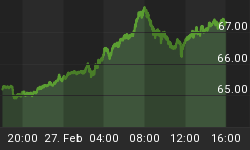... French Manufacturing PMI Plunges to 44.4, Sharpest Contraction in 3 Years
The Pollyannas who thought the European recession would be short, shallow, and contained to the periphery have another thing coming. All three ideas were downright silly as I have long stated.
French Manufacturing PMI Plunges to 44.4, Sharpest Contraction in 3 Years
Markit reports French private sector output falls at sharpest rate for over three years.
Key points:
- Flash France Composite Output Index drops to 44.7 (45.9 in April), 37-month low
- Flash France Services Activity Index unchanged at 45.2
- Flash France Manufacturing PMI falls to 44.4 (46.9 in April), 36-month low
- Flash France Manufacturing Output Index declines to 43.6 (47.5 in April), 36-month low
Latest Flash PMI® data signalled that the decline in French private sector output accelerated further in May.
Marked declines in activity were recorded in both the manufacturing and service sectors during May. In the former, output decreased at the fastest pace in three years, while in the latter the rate of contraction was unchanged from April's substantial pace.
Lower activity reflected a further marked reduction in new business during May. The latest drop in new work was at a rate broadly unchanged from April's three-year record. Panellists commented on weak market demand, lower client activity levels and economic uncertainty as factors leading to the latest fall in new business. Manufacturers reported a particularly sharp reduction in new orders, with the latest decline the fastest for just over three years.
Outstanding business fell at the sharpest rate since July 2009, with declines recorded in both manufacturing and services. Employment also decreased at a faster pace in May, with the latest drop the sharpest for over two years. Job shedding was broad-based across both sectors, with manufacturers indicating the steeper decline in payroll numbers.
German Manufacturing PMI Plunges to 45
Markit reports German private sector returns to contraction.
German private sector returns to contraction. Manufacturing output falls at sharpest pace for nearly three years, offsetting resilient services growth.
Key points:
- Flash Germany Composite Output Index at 49.6 (50.5 in April), 6-month low.
- Flash Germany Services Activity Index at 52.2 (52.2 in April), unchanged.
- Flash Germany Manufacturing PMI at 45.0 (46.2 in April), 35-month low.
- Flash Germany Manufacturing Output Index at 44.6 (47.3 in April), 35-month low.
Manufacturers in Germany pointed to a drop in output for the second month running, and the rate of reduction was the steepest since June 2009.
May data highlighted divergent employment trends across the manufacturing and service sectors. Net job hiring returned to the service economy, but manufacturers signalled the greatest degree of workforce reduction since February 2010.
German private sector input cost inflation was robust and slightly faster than in April, while output charges increased at the sharpest pace since July 2011. The indices measuring inflationary pressures also showed a divergence between manufacturing and services during May.
Manufacturers reported the lowest level of input price inflation for four months, but service providers signalled a much sharper rise in their cost burdens over the month. Moreover, output price inflation in the service economy hit a 14-month high, while factory gate price inflation across the manufacturing sector was the weakest since November 2011.
European PMI Plunges
For a look at the European PMI in general please see Eurozone PMI Disaster - Worst Downturn Since Mid-2009, Manufacturing and Composite at 35-Month Low; Expect Numerous GDP Downgrades, Missed Budget Targets
In the above link I stated "Europe is in a full-blown recession and for the first time in about a year we did not see any Pollyanna comments from Markit economists. Perhaps the news has sunk in that as I have repeatedly said, this recession will be long and deep and Germany would not escape."
More Pollyanna Comments from Markit
I spoke way too soon. Check out this nonsense from Tim Moore, Senior Economist at Markit on the German PMI report:
"Services growth held its ground during May, highlighting resilient domestic demand, but weakening manufacturing output brought the German economy at large into mild contraction for the first time since last November. The underperformance of manufacturing relative to services has not been as extreme since the low point of the recession in early 2009, with a key driver then as now being a steep downturn in export sales. May's drop in manufacturing production was the steepest in nearly three years, and the current period of falling new orders now almost matches the length, though not the depth, of the contraction in 2008/09.
"Continued service sector growth and job hiring is therefore providing an important counterbalance to manufacturing weakness. May's upturn in service providers' confidence about the year ahead outlook is especially encouraging given the headwinds facing the manufacturing sector and ongoing worries among firms about how the euro crisis will play out.".
Service Sector Sap
Please, spare me the sap about service sector confidence in the face of severe manufacturing weakness, plunges in new orders, and an overall collapse in the European economy. The German service sector is going to follow manufacturing in due time, probably sooner rather than later.
Every step of the way pollyannas cling to the slightest hope that somehow Germany is going to avoid a recession or will decouple from the European economy. Mathematically it is nearly impossible.

















